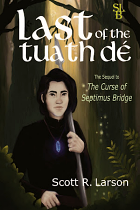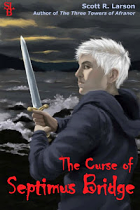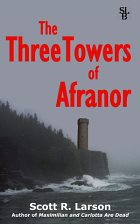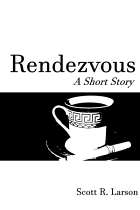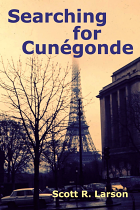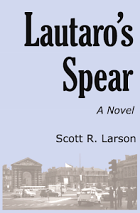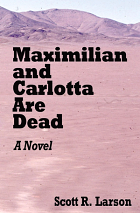Záhrada (The Garden) ★☆☆☆
The Garden is one of those eastern European films that is part Buster Keaton comedy and part metaphysical, quasi-religious exercise. Most of the action takes place (no surprise) in a garden that belonged to the grandfather of Jakub, a teacher. He goes to live there after his father, a tailor, kicks him out because he (very) brazenly carries on with one of his married customers. Many wondrous and perplexing things happen in the garden, and Jakub befriends a strange young girl named Helena (called The Virgin Miraculous in the title cards that appear regularly) who seems to have strange powers. Lots of other bizarre things occur in this film by Slovak director Martin Sulik, including an encounter with a man named Jean-Jacques Rousseau, but it probably helps to have been raised in eastern Europe to get something out of it. (Seen 24 May 1996)
Zawrocony (The Convert) ★★☆☆
This Polish film is set in 1981 when Poland was still in the Soviet orbit and Solidarity was only a dissident movement. After the screening, I heard someone describe it as “Chaplinesque” and that is apt. Tomasz, the main character, is a hapless, comic figure whose misadventures often tickle us. But, as in Chaplin’s Modern Times, he gets caught up in a system that has become inhuman. At the beginning of the story, Tomasz is a flunky, brown-nosing party member. He volunteers to attend a Solidarity rally and collect the names of participants who work at the same nuclear plant he does. But when the marchers begin singing a political hymn full of Catholic references, he gets swept up in the fervor and sings more loudly than anybody. When the Communist militia break up the rally, he is pursued in one of the funniest chase scenes I have ever seen. (This chase is grimly echoed later when Tomasz is in police custody.) The film depicts brutality, but to its credit it glides from slapstick to pathos seamlessly and does not make you feel as though you are watching two movies. Through Tomasz we see why Communism in Poland never really stood a chance in the long run. (Seen 1 June 1995)
Zelig ★★★☆
Eleven years before Forrest Gump there was Zelig. In the middle of his most creative and interesting period as a filmmaker, the prolific Woody Allen showed how archive footage could be woven seamlessly into fiction to entertaining effect. The result was an instant classic of which the title immediately entered the language as a short-hand for somebody who seems to show up at every important place and event. As with all of Allen’s best work, this movie was actually about something. The humorous conceit of a human chameleon, who takes on the physical and personal attributes of those around him, as the film makes clear, says something about the experience of assimilation in general and about the Jewish experience in particular. One gets the idea that it also says something in particular about Allen and his own need to be accepted. And since this is a Woody Allen movie, the hero gets the (younger) girl. In this case it is his real-life partner of the time, Mia Farrow, who had captivated the Woodman when she appeared in his previous film, A Midsummer Night’s Sex Comedy. Here she plays the psychiatrist who becomes fascinated medically and personally by the cipher Leonard Zelig. Composed flawlessly as an old-time documentary with pitch perfect narration by Patrick Horgan, the film nearly convinces us this could all really have happened. In the latter stretch Allen gives Mel Brooks a run for his money in outrageousness by having Zelig seem to interact with none other than Adolf Hitler. The illusion holds up not only because of top-notch editing by Susan E. Morse but also by the willing participation of “interview” subjects like Susan Sontag, Saul Bellow and legendary Parisian saloon-keeper Bricktop, nearly at the end of her 89 years. (Seen 7 August 2016)
The Zero Effect ★★☆☆
The Zero Effect is a low-key little detective yarn that would not be inconceivable as a TV pilot. This is not to say that it doesn’t make for a good flick; it’s just that we wouldn’t mind seeing further adventures of its hero, Daryl Zero (Bill Pullman), and his slow-steaming sidekick, Steve Arlo (Ben Stiller). On the big screen, the film has less action and violence than we are used to these days, but that’s not necessarily a bad thing. More of a problem is some flabbiness in the script, but we can get past that too. Kim Dickens does a nice job as the obligatory (but strangely innocent) femme fatale, and Ryan O’Neal seems continually out of breath as the wealthy client hiding some nasty secrets. Clear and sunny Portland, Oregon provides a refreshing setting for this kind of story. And in brilliant but geeky, work-efficient but socially-insecure Daryl Zero, writer/director Jake (son of Lawrence) Kasdan may have given us the perfect crime solver for the 1990s. (Seen 3 February 1998)
The Zero Theorem ★★☆☆
Good old Terry Gilliam. No one does dystopia like him. The problem though is that, once he made Brazil, how was he ever going to be able to top that? The answer is that he probably never will, although it will always be interesting to see him try. And that supposes that he is even trying to “top” that masterpiece. Despite being set in a visually interesting but familiarly soul-deadening near-future, The Zero Theorem is a different beast from Gilliam’s 1985 classic. Gilliam co-wrote that one with Charles McKeown and Tom Stoppard. This time the screenwriter is Pat Rushin. As Qohen Leth, the hairless programmer who compulsively waits for a mysterious phone call while eschewing human contact and who invariably refers to himself in the plural, Christoph Waltz creates a strange yet sympathetic central character. He is like something out of a play by Beckett or Ionesco. That phone call he slavishly and continually anticipates might as well be from Godot. (It’s probably not insignificant that he lives in an old church.) Given his estrangement from the rest of the world and his overriding need for meaning in his existence, we can never be quite sure if he is merely strange or actually an android. The titular theorem, which he is required to solve in exchange for being able to work at home, is a classic MacGuffin. Don’t hold your breath waiting for a big reveal if and when he solves it. Will Qohen instead find meaning through the alluring Mélanie Thierry or computer shrink Tilda Swinton? Or maybe via brilliant teenager Lucas Hedges (Moonrise Kingdom)? Or maybe the point is that there is no meaning beyond stimulating your senses until you forget all the questions. (Seen 29 July 2014)
Zodiac ★★☆☆
Random thought on watching this based-on-true-events movie about the titular serial killer who terrified the Bay Area in the late 1960s and early 1970s: with the prominent presence of Robert Downey Jr. and Mark Ruffalo, does this count as an unofficial Avengers prequel? (Answer: no.) This flick came out a year before Downey would first play Iron Man and two years before he would first play Sherlock Holmes. Of course, if he had been playing Holmes here, he would have actually caught the serial killer. As Paul Avery, the San Francisco Chronicle reporter covering the case, he puts to good use those well-known Downey trademarks, i.e. the humorously snotty irreverence and the touchingly self-destructive streak. The film is directed by David Fincher, who a dozen years earlier made the state-of-the-art serial killer movie Se7en. The difference this time is that this movie is about a real serial killer, having been adapted from the book by Robert Graysmith, a political cartoonist for the Chronicle who became so obsessed with the Zodiac case that he devoted himself to investigating it and writing books about it and other high-profile crimes. Jake Gyllenhaal plays Graysmith with a worrying fanaticism tending toward creepy. If this were a standard (fictional) serial killer movie, he would either solve the case or else turn out to be the killer himself. The problem with a real-life serial killer movie is that there is not necessarily a nice tidy resolution at the end. In many cases, there is not even a reveal of who the villain is, and that’s the case here. That’s not a spoiler. That’s just the public record, although there is more of an indication of his identity than I was expecting, based on my own incomplete knowledge of the case. At one point, some of this movie’s characters go out to a cinema, and what should be playing other than Dirty Harry, the contemporary Hollywood/Clint Eastwood exploitation of the Zodiac case. It is a useful reminder that reality is not like the movies. While Zodiac has its intense bits, this is after all the story of a killer with only five known victims (though he claimed many more), none of whom was murdered in a particularly imaginative way. The real fascination in this procedural is the effect the case has on the lives of people focused on the case, particularly the journalists and the cops (Ruffalo, Anthony Edwards). Also, James Vanderbilt’s screenplay is full of insightful observations, like the way the American system of localized law enforcement makes a case crossing jurisdictions a bureaucratic challenge. Also, how the emphasis put on handwriting analysis and the state of that art may have been a self-inflicted impediment to fingering a suspect. A large and convincing cast succeeds in making us believe this is probably how it all happened. Brian Cox makes a particular impression as the flamboyant celebrity attorney Melvin Belli. Cox, as it happens, was the first actor to portray on screen (two decades earlier in Michael Mann’s Manhunter) the serial killer Hannibal Lecter. (Seen 11 September 2020)
Zonad ★☆☆☆
Frankly, the description and photo in the Film Fleadh program made this movie seem a bit dodgy. But I went anyway, on the strength of its having been directed and co-written (along with his brother Kieran) by John Carney, who gave us On the Edge and Once. So how was it? Well, dodgy. It looked like everyone had a great time working on the film, but it’s essentially a three-joke comedy sketch stretched out to feature length. We know right away we may be in trouble when our rural village setting turns out to be Avoca, County Wicklow, and no effort is made to disguise the fact that it’s the same place where Ballykissangel was filmed. And then the characters seem to have stepped out of a US 1950s sitcom and are one-note/two-dimensional types. The fact is that this could have been a pretty good comedy if it had been treated a bit more seriously and the Carneys weren’t so busy amusing themselves. It could have been a sci-fi version of The Music Man. But instead we get leering jokes about promiscuous teenage girls and idiot villagers. Simon Delaney (Spin the Bottle, The Actors, Intermission) shows up in our idyllic and space-obsessed hamlet in a strange costume and is presumed to be an extra-terrestrial visitor. There are some laughs along the way, but after it’s over, you don’t really feel like you’ve seen a real movie. (Seen 11 July 2009)
Zoo ★☆☆☆
I wish I could be as detached as the woman I overheard after the screening, who obviously knew her horses and was calmly explaining to her friends that, in at least one scene, the horse in question was a mare and not a stallion. I was really creeped out by this documentary. I went to see it, of course, because I thought it might assuage some of my homesickness for King County, Washington, where I still cast my votes. I was familiar with the incident at the center of the film—even all the way over here in Ireland. As with The Killing of John Lennon, I thought it might be good to know something more about a notorious event, but after the fact I can’t say that it was. The film’s central problem is that there is precious little primary footage available. So the film consists of audio interviews, accompanied by recreations by actors and a few of the actual people. The photography is shadowy and sinister and accompanied by music (by Paul Matthew Moore) that tries to sound as much as possible like Philip Glass. In other words, director Robinson Devor is trying to be Errol Morris. As well, the fact that these not-strictly-natural events were going on beneath the placid veneer of a Pacific Northwest town inevitably brings up echoes of Twin Peaks. Perhaps the most Lynchian moment is a surreal scene where we watch a group of authorities reacting in horror and disgust to a video of the sort of unnatural act that led to the accidental death of a Boeing employee. If there is any point to this movie, it is to allow us to get inside the head of people who call themselves zoo, i.e. zoophiles. I take full responsibility for freely choosing to see this movie, but in the end, that head was one more place that I really didn’t need to go. (Seen 18 October 2007)
Zoolander ★★☆☆
This is actually pretty funny, even though it is essentially a one-, well maybe two-joke movie. Based on a character Ben Stiller created a few years ago for a TV awards show, Zoolander has the feel of yet another comedy derived from a Saturday Night Live skit, or even one from Stiller’s own short-lived 1992 sketch comedy show. Director/co-writer/star Stiller takes aim at two easy targets: the vacuous, shallow world of (male) fashion modeling and Hitchcock-style suspense thrillers. To his credit, it mostly holds our attention anyway, thanks in part to many humorous cameo appearances, since many of the people being lampooned (e.g. Fabio) are anxious to show their hipness by being part of the joke. The most effective cameos by far are by David Bowie and David Duchovny. Stiller gets good support from his parents and his wife, who are also featured, but he is a bit unfortunate in his timing since a lighthearted romp about brainwashed political assassins feels a bit strange right now. And it doesn’t help that the setting is New York City, since we find ourselves involuntarily scanning the shots of Manhattan to see if the twin towers are there. (Seen 9 October 2001)
Zugvögel (Trains and Roses) ★★★☆
For some reason the name Trains and Roses sounds to me like it should be a Scottish heavy metal band, but it’s actually the English title that’s been put on this delightful and gentle comedy from German director Peter Lichtefeld. A quirky road (actually, train track) movie about an introverted beer truck driver trying to realize his dream of participating in and winning the international train schedule competition (you have to memorize all the train schedules in the world and figure out instantly the quickest way from one place to another), we get taken for a pleasant journey through Germany, Sweden and the northernmost reaches of of Finland. Coincidence, mystery, and an unlikely romance are the ingredients in this comic mix. Lichtefeld says that one of his earliest cinematic influences was Sergio Leone’s Once Upon a Time in the West, and as a result the latter half of the movie features a sly and clever homage to that film’s opening scene. (Seen 24 August 1998)
Zusje (Little Sister) ★★☆☆
The idea behind Little Sister is one of those clever ones that sounds neat but presents considerable problems for its execution. The premise is that the film is made by a man with a video camera à la cinéma verité. Martijn has returned to The Netherlands after living in London for several years. He imposes himself on his sister Daantje, intending to videotape everything that happens while he is there. This gets constraining after a while, but the concept gets expanded as other people sometimes get control of the video camera and with the introduction of a second video camera toward the end. The movie even includes flashblacks, which take the form of snippets of old home movies that are inserted into the film. Maartijn is obsessed with something that happened between him and Daantje when they were children and eventually we find out just what it was. Much of the film is discomfiting, as Daantje and her friends are annoyed by being videotaped all the time. At the same time there is also a strange voyeuristic appeal to the film as we feel we are seeing things we are not meant to see. Overall, Little Sister is intriguing, but in the end that is owed more to its concept than to its plot. (Seen 6 June 1996)















